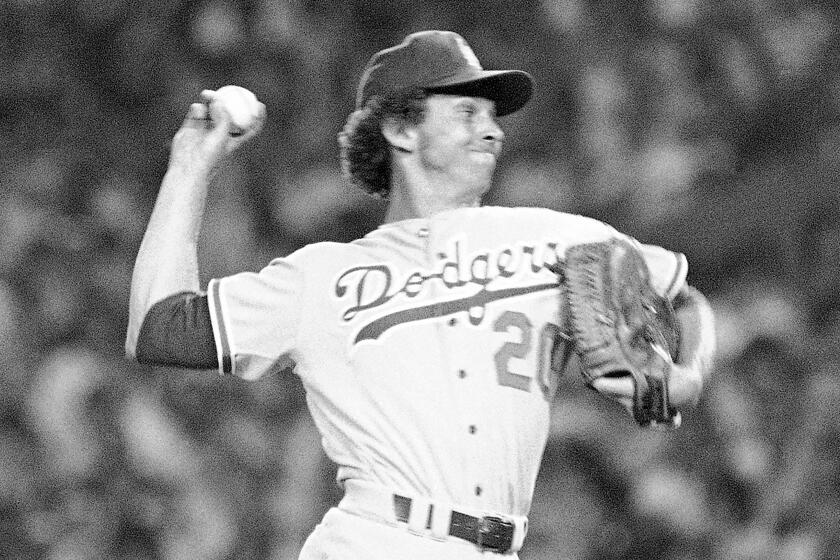Beltre’s Slow Recovery From Appendicitis and Infection in Dominican Hospital Leaves Him and Dodgers in
- Share via
VERO BEACH, Fla. — Five weeks until opening day, the Dodgers’ starting third baseman walks slowly into the clubhouse for lunch.
“I’ll be done in about 20 minutes,” he says.
He pours clear soup and orange juice into two small paper cups, carries them to the long table in the middle of the room and sits carefully in front of them.
He stares at the soup, takes one sip. He stares at the juice, then pushes it away. He puts his head in his hands.
He throws the cups in the trash.
Five minutes have passed.
“OK, you want to talk now?” he says.
His name is Adrian Beltre, and this is not about his glove, it is about his bag--the one attached to his abdomen to catch leaking body fluids.
This is not about his spot in the batting order, it is about the IV port in his arm--the one through which he is fed every night.
This is not about the Dodgers’ brightest young player. It is about their biggest spring problem.
Despite complications caused by an emergency appendectomy performed in a small-town hospital in the Dominican Republic in January, Beltre is supposed to ready for opening day April 2.
One look at him and you think, “Not a chance.”
He hasn’t eaten solid food since Jan. 11. He hasn’t exercised much beyond a treadmill. His uniform hangs on a gaunt body that has lost 20 pounds.
While the Dodger world has revolved around unhappy Gary Sheffield, Beltre has suffered in the shadows, enduring the discomfort of the abdominal bag during the day, sleeping restlessly with an IV connected to his arm at night.
A nurse comes to his condo to insert the line. Beltre takes it out himself in the morning. The port remains taped to his biceps.
“Sometimes I think, ‘Why can’t everything be simple? Why do I have to go through all this?’ ” he says. “But then I think, eventually it will get better. And I will forget.”
Until then, pinch-hitter Dave Hansen or utility man Tim Bogar will play the position that accounted last year for 20 homers and 85 RBIs.
“It will be OK, we have enough guys, our team will be fine,” Beltre says.
As if anybody believes him.
Nobody has an educated idea when Beltre will return. Until the wound closes, he cannot even begin serious rehabilitation.
That the surgery was performed in another country using older technology makes answers more difficult.
Beltre thought the incision was closing last week, but then he started leaking more fluids.
Any prediction is a guess. Any predictions that he will return before the end of April might be a bad guess.
“Should this [wound] close soon, I don’t see any reason he couldn’t be ready opening day,” says team internist Michael Mellman. “But the more time passes before that happens, the more difficult it would be.”
Time is an issue here in other ways.
There have been rumblings that Dodger officials should have moved their $5-million player out of the Dominican Republic before he required surgery, or rushed him out immediately afterward.
Beltre is not complaining, and the Dodgers say they did their best under the circumstances.
But the situation is as muddled as the wound.
Beltre recalls that on Jan. 10, in the small town of San Pedro de Macoris, he began suffering from stomach pains.
He called the Dodger trainers and was told to go to the hospital as a precautionary measure.
Doctors there sent him home.
“My right side really hurt bad, but I had no fever and I wasn’t throwing up,” Beltre says. “They said they couldn’t find anything.”
Two days later, on Jan. 12, he returned to the hospital in unbearable pain. Doctors operated and discovered a ruptured appendix, accompanied by an infection typical to the internal trauma.
Beltre spent the next 18 days in the hospital, fighting the infection, before the Dodgers figured he was stable enough to fly to Los Angeles.
But could all this have happened sooner?
It seems that once Beltre’s appendix ruptured, there was nothing anyone could do. He was too sick to be moved, and doctors apparently were treating the infection as it would be treated in this country.
“Once it ruptured, the die was cast, and doctors did as good as they could have done, just what we would do,” says Mellman.
But what about before it ruptured?
Mellman acknowledges that the Dominican hospitals aren’t as equipped to spot appendix problems as those in the United States.
“It’s a Third World country, and while doctors there do a really good job, technologically they treat potential appendix problems like we did 30 years ago,” Mellman says.
In other words, had Beltre been in the United States, perhaps his problem could have been properly diagnosed.
Which, based on when Beltre complained of abdominal pains, gave the Dodgers about 36 hours to get him out of the country.
“Except you don’t fly somebody out of the Dominican just because of a stomachache,” Mellman says.
If only the Dodgers had known that Beltre clearly suffered from more than a stomachache.
Either he didn’t relate this to officials, or those officials didn’t understand.
Athletes, particularly brave young ones like 21-year-old Beltre, have high tolerance to pain. This was surely part of the problem.
Organizations need to figure this into the equation. Or, in the case of kids like Beltre in Third World countries, find somebody close to the athlete who can give them the real story.
Beltre speaks good English. But he also refuses to take himself out of the lineup.
With only 36 hours to make a decision, based on limited information, perhaps there was nothing the Dodgers could do.
But perhaps it’s worth examining the off-season flow of information from players to the club to help prevent something like this from happening again.
It’s not as if their Dominican pipeline hasn’t been the site of problems before.
“Given the information we had, we did the best we could do,” General Manager Kevin Malone says.
Now the best anyone can do is patiently wait.
Los Angeles wants the kid to play. Adrian Beltre just wants to eat.
*
Bill Plaschke can be reached at his e-mail address: [email protected].
More to Read
Are you a true-blue fan?
Get our Dodgers Dugout newsletter for insights, news and much more.
You may occasionally receive promotional content from the Los Angeles Times.








